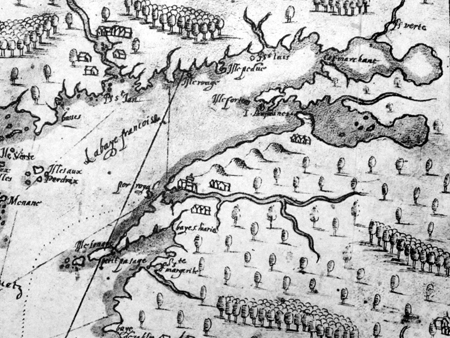I’ve been awarded a postdoctoral fellowship from the Eccles Centre for North American Studies at the British Library. Eccles Centre Visiting Fellowships are intended to help support scholars wishing to visit London to use the British Library’s collections relating to North America and are basically a rare book and old map lover’s dream come true.

the region of Atlantic Canada where I was born, in Champlain’s map of 1607
I am applied for an Eccles Centre Visiting Fellowship in order to undertake further research into the writing (and erasing) of Atlantic Canadian coastlines toward the publication of a monograph tentatively titled ‘Writing Coastlines: On the Composition of Atlantic Canada’.
By ‘Writing Coastlines’ I refer both to cartographic and textual writing about coastlines, and to the writing and erasing of physical coastlines through erosion and accretion, wave actions and storm events. Rather than presenting a historiographical narrative in which the coastlines of the ‘New World’ emerge through a linear progression of discoveries, I aim to frame the writing of these coastlines as an ongoing compositional process. To demonstrate this argument, I intend to draw upon a wide variety cartographic, archival, and literary materials held at the British Library, with an emphases on foundation documents of Canadian history produced in England and France in the sixteenth and seventeenth centuries.
This research will build upon portions of my recently completed PhD thesis, Writing Coastlines: Locating Narrative Resonance in Transatlantic Communications Networks. During this research I made extensive use of the Rare Books, Manuscripts, and Maps collections at the British Library. This Visiting Fellowship will allow me to spend more time with the documents I have already consulted and, critically, will allow me to identify and study secondary sources including lesser-known maps, sea charts, ship’s logs, cosmographies, diaries, letters, arguments, treatises, and discourses for discovery. Through a comparative cartographic and textual analysis of these material texts I aim to show how the coastlines of Atlantic Canada have been written and re-written, drawn and re-drawn, formed and transformed, altered and erased by successive generations of fishers, sailors, explorers, settlers, soldiers, captains, navigators, cartographers, politicians, journalists, and literary authors. These coastlines have been composed through centuries of dead-reckoning, careful surveying, and sounding, as well as less than perfect navigation and charting techniques; through willful misrepresentation of dangers and distances; through the transposition of European place and family names onto places which already had names, whether assigned by earlier explorers or by native peoples; through subsequent mishearings, misspellings, translations, and adaptations of these names over the course of centuries of habitation; and though literary re-imaginings of first encounters with the natives, animals, and climatic conditions of these coasts.
During the Eccles Centre Visiting Fellowship I will begin work on a new chapter, ‘Arguments to Prove a Passage,’ focused on distortions of Atlantic Canadian coastlines perpetrated in material texts written to elicit support for voyages Northwestward, traces of these voyages written in place names (Davis Inlet, etc), and arguments made to prove a Northeast Passage.